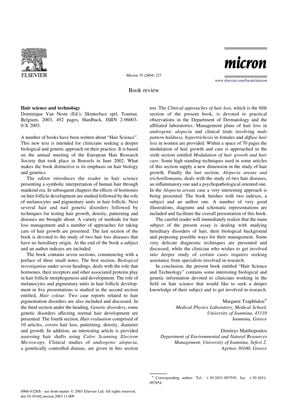TLDR The book "Hair Science and Technology" provides a deep understanding of hair biology and genetics, discusses hair growth, density, and diseases, and offers methods for managing hair loss and caring for hair growth.
The book "Hair Science and Technology" from 2004, edited by Dominique Van Neste, was intended for clinicians seeking a deeper understanding of hair biology and genetics. The book was based on the annual meeting of the European Hair Research Society in 2002. It covered a range of topics including the effects of hormones on hair follicle development, the role of melanocytes and pigmentary units in hair follicles, genetic disorders affecting hair and nail, techniques for testing hair growth, density, patterning and diseases, methods for hair loss management, and approaches for hair growth care. It also studied two hair loss diseases with no hereditary origin. The book was noted for its emphasis on studying hereditary disorders of hair, their biological background, and proposing possible ways for their management. It also presented delicate diagnostic techniques.
January 2023 in “Journal der Deutschen Dermatologischen Gesellschaft” Early diagnosis and personalized treatment are crucial for managing hair loss in children.
 1 citations
,
August 2018 in “Journal of The American Academy of Dermatology”
1 citations
,
August 2018 in “Journal of The American Academy of Dermatology” Dutasteride and minoxidil mesotherapy effectively treats hair loss with minimal side effects.
 7 citations
,
March 2017 in “Actas Dermo-Sifiliográficas”
7 citations
,
March 2017 in “Actas Dermo-Sifiliográficas” Several new treatments for different types of hair loss show promise in improving patient quality of life.
 110 citations
,
August 2016 in “Drugs”
110 citations
,
August 2016 in “Drugs” Minoxidil is the only FDA-approved topical drug for treating male or female pattern hair loss, and other medications like finasteride and dutasteride can also increase hair growth.
January 2012 in “Journal of Practical Dermatology” Various treatments can help manage hair loss in androgenetic alopecia.
21 citations
,
March 2005 in “PubMed” Topical minoxidil and finasteride help treat male baldness, while women benefit from antiandrogens and minoxidil.
January 2005 in “Farmaceutski glasnik” Minoxidil and finasteride are key treatments for hair loss.
 14 citations
,
September 2003 in “Archives of Dermatology”
14 citations
,
September 2003 in “Archives of Dermatology” Finasteride may not stop severe hair loss after stopping minoxidil.
 72 citations
,
January 2001 in “Drugs”
72 citations
,
January 2001 in “Drugs” Minoxidil and finasteride treat hair loss; more research needed for other options.






